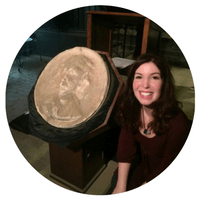
I worked as an assistant editor (for long hours and low pay) for a boss who didn’t respect me.
Headed home from yet another 14-hour day of copyediting gibberish to an apartment I could barely afford—I worked at a downtown gift shop on the weekends to make ends meet—the thought hit me like a ton of bricks. Was this all there was for me?
I had a Master’s in writing and the idealism to change the world. Yet my boss was making fun of my thrift-store clothes and the fact that I stuttered at meetings when I got nervous. What the heck happened to my dreams?
I confided in a co-worker who must have spoken with my boss, because when the next financial newsletter came in to be edited, my boss brought me to her office and offhandedly mentioned a travel company wanting to update content for a Washington, DC destination guide.
She was too busy for the project—and the measly $500 was too small—so she asked if I wanted the job before she told them no outright. She said she would recommend me for the work, but I would have to send them my writing samples and a resume.
This could be my chance, I thought.
I pictured a beautiful and exciting world of smiling faces and Mediterranean breezes, of airplane rides far, far away from the DC crowd where people dined on pasta outdoors and laughed well into the night. I culled through my grad school papers and sent my best piece along with the latest financial newsletter I’d worked on.
The assignment is yours, the travel company responded.
They sent me a 50-page document in 8.5-point type and said they needed my edits and additions in a month. I knew $500 wasn’t a lot of money, but I treated that document better than my most pressing stock market update.
I researched every listing and traipsed around the city, reconnecting with old friends to try out this new restaurant and check out that club. I started to feel alive again.
Since so many of the sites in DC were free, and there were so many to boot, I edited every line of existing copy and then brainstormed which attractions the publisher might have missed. I made my goal to add at least 25 new listings. I turned it in the afternoon it was due.
After I submitted it, my travel editor (whom I’m friends with to this day) said it was the most thorough job she had ever seen. Emboldened, I offered to be their intrepid correspondent (since travel writers are usually locals), happy to work on destinations they couldn’t find others to take on, or wouldn’t take on.
I became their pinch hitter in a way. Places no one else wanted, I greedily scooped up—including a trip I loved that took me to Houston. That city has amazing Mexican food and the Mark Rothko chapel was a life-expanding experience!
I was on a roll: I figured out ways to stretch the fee by taking on multiple assignments in close-by cities that would cover my airfare.
A few years later, a promotion at another publishing company moved me to Florida, where, on the side, I updated destination guides in the southern states and the Caribbean, and then I moved to Ireland, where European destinations tempted me. I wouldn’t be there for too long as a serious illness compelled me home.
In my recovery, I was determined to never work another “desk job,” and instead decided to start my own writing business. I sent a letter of inquiry to Fodor’s but didn’t expect a response. Three weeks later, an email came back, enthusiastic about my portfolio with a promise for the future. They were my first business client, and what a client at that! I now have a byline in several Fodor’s books and online travel guides. In total, I’ve covered more than 75 destinations around the world, and this content is licensed by Yahoo! and USA Today.
I always try to over-deliver on these assignments at both ends of the creative spectrum, be that by charting new territory or thinking about what isn’t there already.
I wouldn’t trade this gig for the world.
Travel Writing Resources
How To Become A Travel Writer – The Easy Way
Easy Steps To Landing Your First Byline As A Travel Writer
Marketing For Travel Writers: 5 Ways To Get Started
22 Travel Story Ideas To Get You Published

